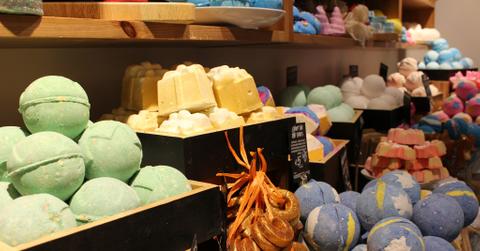Lush Is Packaging Their Products In Ocean Pollution To Help Clean Up The Beaches
Handmade cosmetics company Lush is doing one better than putting its products in recycled containers. The brand has partnered with two environmental groups to clean up plastic trash on Canadian beaches and have it turned into 100-percent recycled containers for bath soaps and lotions.
Updated May 24 2019, 2:48 a.m. ET
It’s one thing to recycle items that have been sorted into the appropriate bin. It’s another thing to seek out items that should have been recycled, weren’t, and wound up in the ocean instead of a landfill. That’s exactly what handmade cosmetics company Lush is doing, through a partnership with Ocean Legacy Foundation and Urban Resource Group. The plan—already underway—is to collect 27 tons of plastic from the shores of British Columbia’s Vancouver Island in Canada and turn it into the bottles and pots Lush products come in.
Lush has maintained its humble ethos since day one.
The company began in England in 1995, 18 years after its founders Mark Constantine and Liz Weir met at a beauty salon where they both worked. After going off on their own to produce homemade batches of goodies for The Body Shop and a venture of theirs called Cosmetics to Go, Constantine and Weir started a brand new kind of storefront.
The pair’s soapy offerings were all small batch, so the day’s “specials” were etched onto chalkboards—a practice every Lush shop on the planet still employs.
Besides being handmade to this day, Lush stands by several other ethos: absolutely zero products are tested on animals; all ingredients must be vegetarian and derived from fruits, vegetables or safe synthetics; and packaging and preservatives must be kept at a minimum. Today, Lush has more than 800 stores in 51 countries—yet not a single of its standards has been compromised.
In fact, Lush’s commitment to the environment has only grown. In June, Lush encouraged their fans to go nude in order to draw attention to over-packaging. They offer a shark fin soap on World Ocean’s Day. And now, they’re going to be making a limited-edition run of bottles for products made entirely out of ocean shoreline garbage.
It takes a village.
The Ocean Legacy Foundation is an international non-profit organization that works on spatial mapping, education and research, cleanup projects, and plastic-to-fuel technologies. The Urban Resource Group Inc., an affiliate of Canada Fibers (a recycling brokerage operation), was launched in 2015 as a conglomerate of four companies: Urban Polymers, Urban Waste Recycling, Urban Biofuels and Urban Garden Products.
Lush in late 2016 delivered plastic collected from a six-month ocean cleanup project with the Ocean Legacy Foundation to the Urban Resource Group’s plastic recycling facility in Toronto to be turned into pellets for eventual construction of Lush packaging.
To turn the plastic garbage into pellets, scientists on staff at the Urban Resource Group had to test all materials utilizing automated machines and then employ trials to eventually determine the best way to create high-quality plastic pellets that could be turned into 100-percent recycled cosmetic containers.
Give these post-consumer products a whirl.
Intrigued? Then check out these Lush products, packaged in post-consumer trash:
And don’t forget—you can trade in any five of LUSH’s empty black pots to retail locations and get a free facemask in return. See? Karma really is a wonderful thing.
